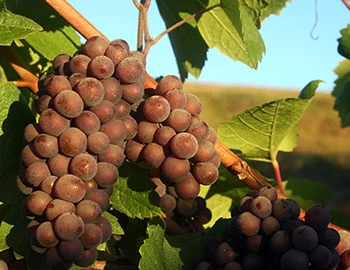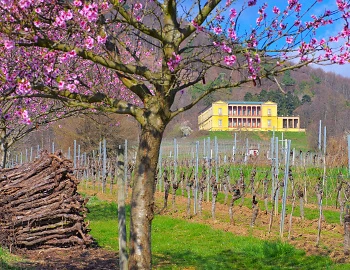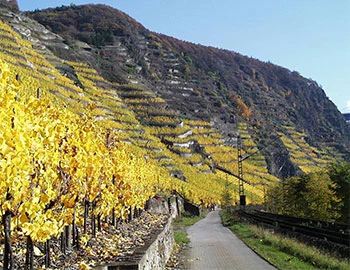Grauburgunder 2023
QbA Pfalz, Rings, 750 ml

| Grape variety: | Grauburgunder |
| Producer: | Rings |
| Origin: | Germany / Pfalz |
Description
Powerful Grauburgunder (Pinot Gris) influenced by loess and gravel with an inviting fruitiness of honeydew melon and fresh pears and a pleasantly creamy character.
Attributes
| Origin: | Germany / Pfalz |
| Grape variety: | Grauburgunder |
| Label: | Vegan, Certified organic or biodynamic wine |
| Ripening potential: | 2 to 6 years |
| Drinking temperature: | 10 to 12 °C |
| Food Pairing: | Italian antipasti, Apéro pastries, Fresh water fish with cream sauce, Asparagus specialities, Mushroom ragout, Salad with vegetables, pulses, pasta |
| Vinification: | soft pressing, fermentation in steel tank, fermentation at low temperatures |
| Harvest: | hand-picking with simultaneous grape sel |
| Maturation: | partly in steel tank, partly in wooden barrel/foudre |
| Volume: | 12.5 % |
| Note: | Contains sulphites |
Grauburgunder
The aromas of the forest
Pinot gris is, like the Pinot blanc, a colour mutation of Pinot noir. All three have the same genetic profile. On occasion, red, grey, pink and white, berries can be observed on the same vine stock. Some are even striped! The best Pinot grises introduce themselves opulently with ripe peach and apricot aromas, slightly woody notes and a bit of smoke. These characteristics are presented, for example, in examples from Alsace, Grauburgunders from Germany, or the representatives from Valais, where the grapes are erroneously referred to as Malvoisie. In Italy, Pinot grigio from South Tyrol and Friuli win out. Wines from this variety are great culinary companions. They get along superbly with autumnal dishes such as risotto with mushrooms or chestnuts.

Pfalz
Pfalz: Riesling meets Burgundy
Palatine winemakers manage the feat of vinifying top-tier crus from both white and red varieties. In addition, Riesling presents the same class here as Chardonnay and other Burgundy varieties. This versatility at high quality levels makes Germany’s second-largest wine region a trove of discoveries of all kinds. Tranquil winegrowing towns with a diverse range of culinary offerings and hotels make the Palatinate region a perfect wine travel destination.

Germany
Germany – Into the elite the hard way
Sitting in the heart of Europe, the hilly, lake-dotted landscape of Germany provides ideal, fertile soil for the most diverse vine varieties. From Albalonga to Zweigelt, over 140 different grape varieties are grown on about 100,000 acres, cared for by nearly 50,000 vintners. Most of these vintners are young, modern, internationally trained, inquisitive and urbane. It is hardly surprising, then, that German wine has a good reputation well beyond the country's borders.



